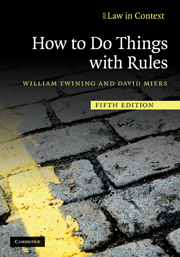Book contents
- Frontmatter
- Contents
- Preface
- Online appendices
- Acknowledgements
- Abbreviations
- Table of statutes and legislative instruments
- Table of cases
- Part I
- Part II Reading, using and interpreting rules in general
- 2 Problems and mischiefs
- 3 Of rules in general
- 4 Interpretation and application
- 5 Imperfect rules
- Part III Reading law: reading, using and interpreting legislation and cases
- Part IV
- Index
- Resources on the web
- References
4 - Interpretation and application
Published online by Cambridge University Press: 05 June 2012
- Frontmatter
- Contents
- Preface
- Online appendices
- Acknowledgements
- Abbreviations
- Table of statutes and legislative instruments
- Table of cases
- Part I
- Part II Reading, using and interpreting rules in general
- 2 Problems and mischiefs
- 3 Of rules in general
- 4 Interpretation and application
- 5 Imperfect rules
- Part III Reading law: reading, using and interpreting legislation and cases
- Part IV
- Index
- Resources on the web
- References
Summary
Why interpret? The answer will be different for different domains. But the diverse answers have something in common. They all show the point of having room for variety within a more or less restrictive framework of continuity, which establishes a common backbone to diverse variations. Moreover, in all of them … the case for pluralistic interpretation is a case for innovative interpretation. Innovative interpretations are ways of combining tradition with renewal, general social forms with individual perspectives.
(Raz, Between Authority and Interpretation (2009), p. 315)In Appendix I we illustrate some points about Holmes's Bad Man by presenting a simplified model of Anglo-American criminal process in the form of a flowchart entitled ‘The Bad Man in Boston’. This chart depicts the criminal process as a series of decisions and events, involving a variety of participants with different roles to perform at different stages in the process. When the Bad Man is viewed in the context of this process, it is easy to see that he is only one of a number of participants, and that his concern with predicting future events is only one aspect of a complex cluster of tasks that occur at different points in the process, in which other tasks are involved, such as detection, determining what has happened in the past, and sentencing.
In Chapter 2 we focused mainly, but not entirely, on the standpoint of the rule-maker, that is to say on actors who are in a position to introduce, change or adjust a rule in the process of tackling a problem.
Information
- Type
- Chapter
- Information
- How to Do Things with Rules , pp. 121 - 147Publisher: Cambridge University PressPrint publication year: 2010
